2024届高考英语二轮复习:代词课件(共24张PPT)
文档属性
| 名称 | 2024届高考英语二轮复习:代词课件(共24张PPT) | 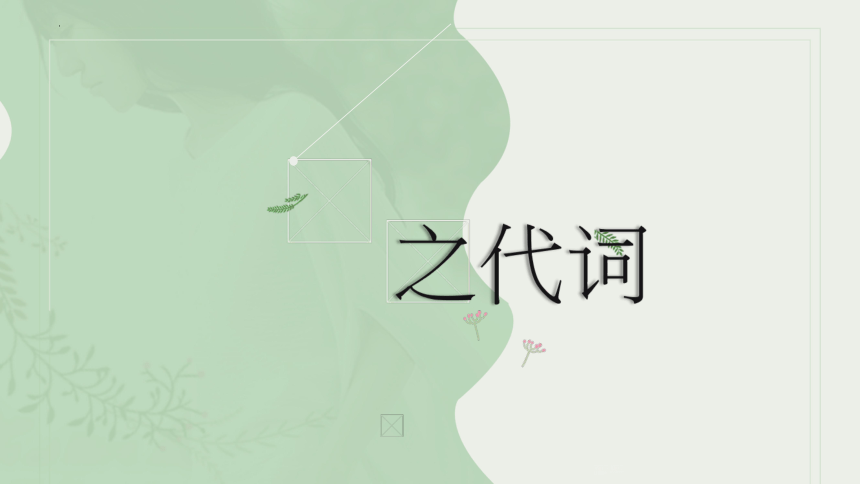 | |
| 格式 | pptx | ||
| 文件大小 | 835.8KB | ||
| 资源类型 | 教案 | ||
| 版本资源 | 通用版 | ||
| 科目 | 英语 | ||
| 更新时间 | 2023-07-16 21:00:26 | ||
图片预览

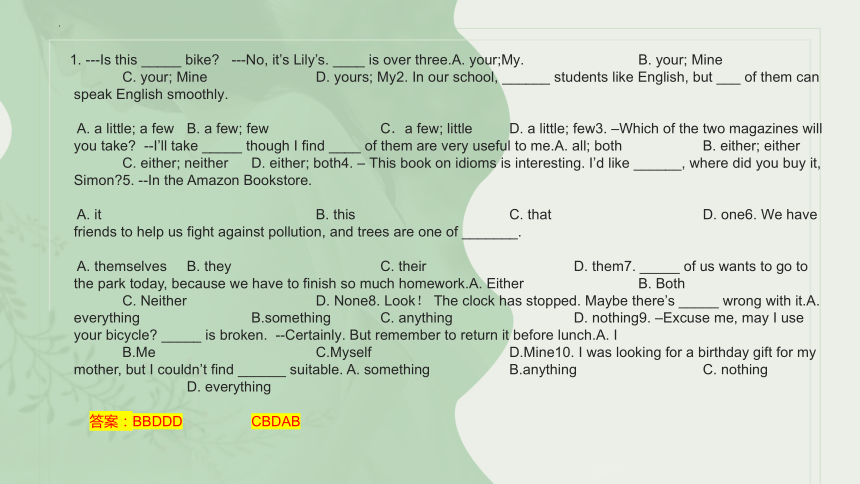
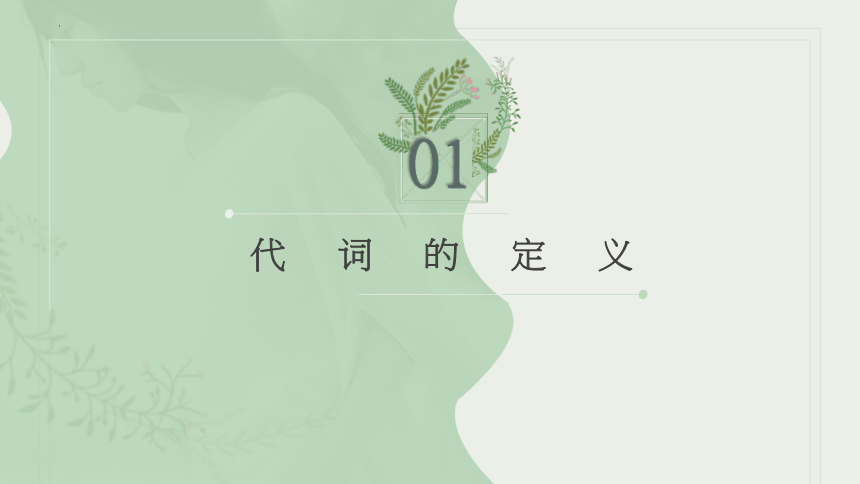
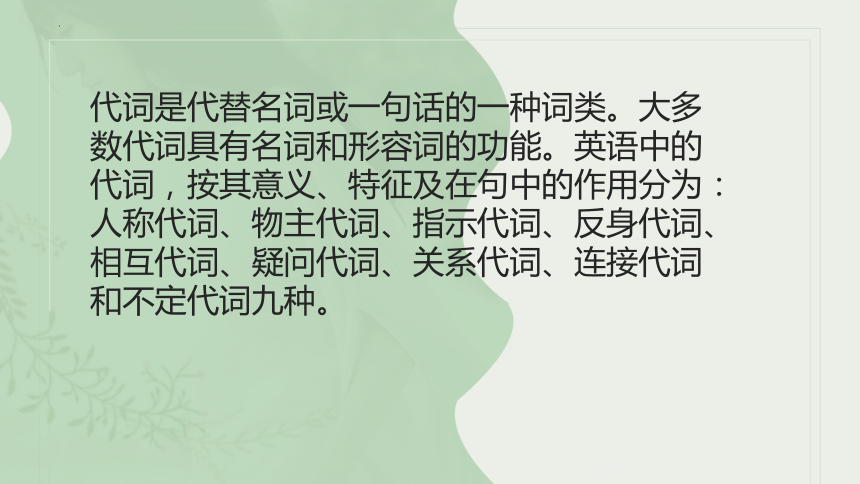
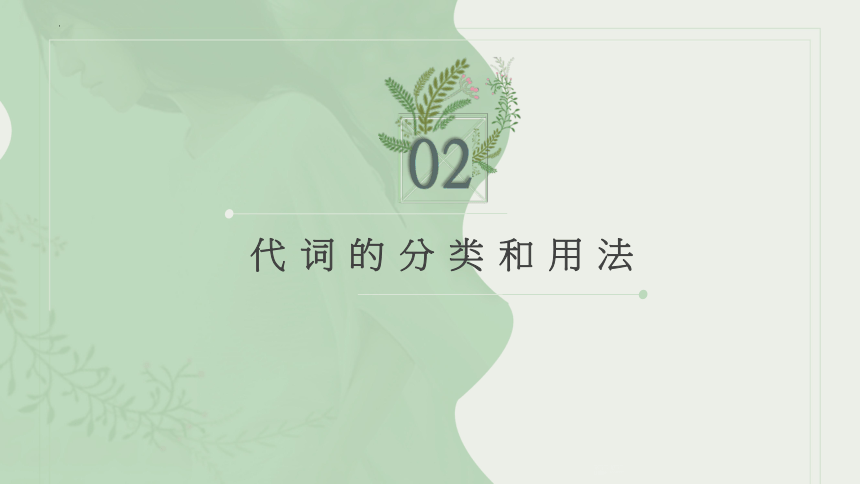

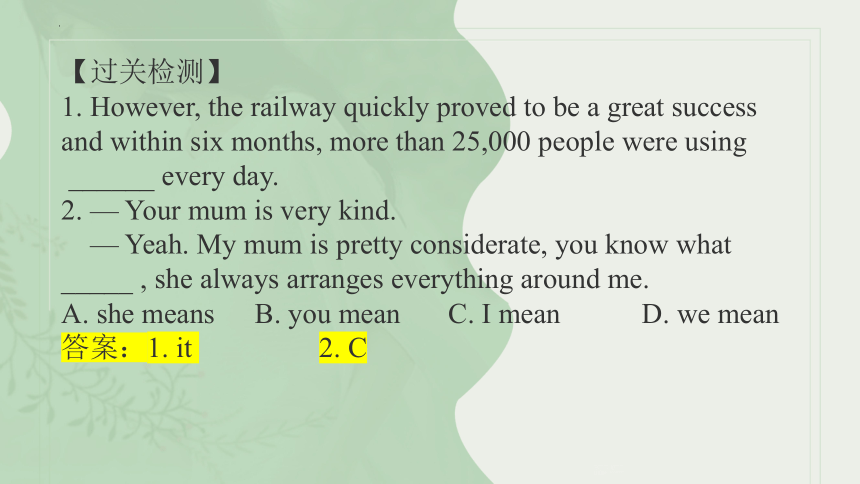

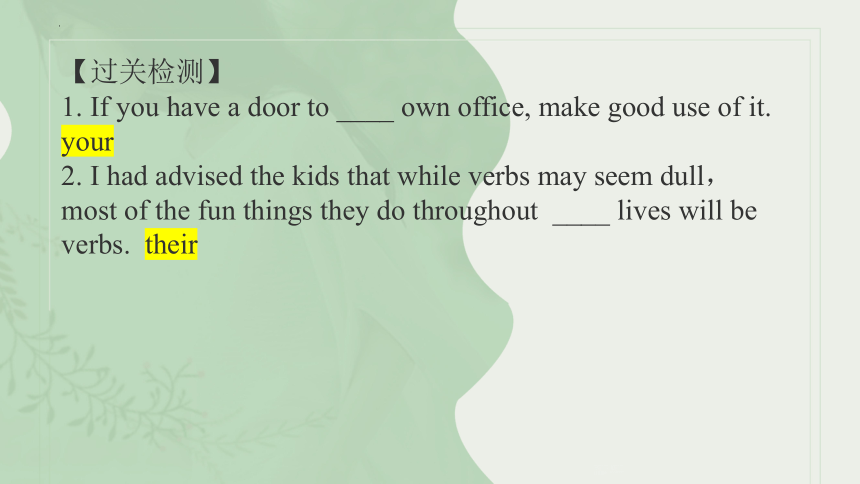
文档简介
(共24张PPT)
之代词
1. ---Is this _____ bike ---No, it’s Lily’s. ____ is over three.A. your;My. B. your; Mine C. your; Mine D. yours; My2. In our school, ______ students like English, but ___ of them can speak English smoothly.
A. a little; a few B. a few; few C.a few; little D. a little; few3. –Which of the two magazines will you take --I’ll take _____ though I find ____ of them are very useful to me.A. all; both B. either; either C. either; neither D. either; both4. – This book on idioms is interesting. I’d like ______, where did you buy it, Simon 5. --In the Amazon Bookstore.
A. it B. this C. that D. one6. We have friends to help us fight against pollution, and trees are one of _______.
A. themselves B. they C. their D. them7. _____ of us wants to go to the park today, because we have to finish so much homework.A. Either B. Both C. Neither D. None8. Look! The clock has stopped. Maybe there’s _____ wrong with it.A. everything B.something C. anything D. nothing9. –Excuse me, may I use your bicycle _____ is broken. --Certainly. But remember to return it before lunch.A. I B.Me C.Myself D.Mine10. I was looking for a birthday gift for my mother, but I couldn’t find ______ suitable. A. something B.anything C. nothing D. everything
答案:BBDDD CBDAB
代词的定义
01
代词是代替名词或一句话的一种词类。大多数代词具有名词和形容词的功能。英语中的代词,按其意义、特征及在句中的作用分为:人称代词、物主代词、指示代词、反身代词、相互代词、疑问代词、关系代词、连接代词和不定代词九种。
代词的分类和用法
02
1. 人称代词
第一人称单数 第二人称单数 第三人称单数 第一人称复数 第二人称复数 第三人称复数
主格 I you he she it we you they
宾格 me you him her it us you them
注意事项:主格用来做句子的主语e.g.l I often go shopping on Sundays.l Are they from Brazil 宾格用来做及物动词或者介词的宾语e.g.l Who teaches you English this year l We often write letters to her.
【过关检测】
1. However, the railway quickly proved to be a great success and within six months, more than 25,000 people were using
______ every day.
2. — Your mum is very kind.
— Yeah. My mum is pretty considerate, you know what _____ , she always arranges everything around me.
A. she means B. you mean C. I mean D. we mean
答案:1. it 2. C
2. 物主代词
第一人称单数 第二人称单数 第三人称单数 第一人称复数 第二人称复数 第三人称复数
阳性 阴性 中性
形容词性 my your his her its our your their
名词性 mine yours his hers its ours yours theirs
注意事项:形容词性物主代词作句子中名词的修饰语,后面要跟名词。即“形物代+名词”e.g.l Is that your umbrella l I often go to see my aunt on Sundays. 名词性物主代词相当于名词,既代替事物又表明所属关系,在句子中往往独立地做主语、宾语或者表语,后面不可以跟名词。即“形物代+名词=名物代”e.g.l This is your cup, but where is mine Your classroom is very big, but ours is rather small.
【过关检测】
1. If you have a door to ____ own office, make good use of it. your
2. I had advised the kids that while verbs may seem dull,most of the fun things they do throughout ____ lives will be verbs. their
3. 反身代词
第一人称单数 第二人称单数 第三人称单数 第一人称复数 第二人称复数 第三人称复数
myself yourself himself herself itself ourselves yourselves themselves
注意事项:反身代词在句子中作宾语表示反射(指一个动作回到该动作执行者本身)e.g.l I Don’t play with the knife, you might hurt yourself. 在句子中作同位语表示强调(即用来强调名词或代词的语气)e.g.l The story itself is good. Only he didn’t tell it well.
过关检测
1. Our neighbours gave ____(we) a baby bird yesterday that hurt ___(it) when it fell from its nest.
2. At first, I thought I knew everything and could make decisions by ____(I).
答案:1. us, itself 2.myself
4. 指示代词
单数 复数 含义
this(这个) these(这些) 时间或空间上较近的人或者事物
that(那个) those(那些) 时间或空间上较远的人或者事物
it (这人/这物) 同类同物/特殊用法
注意事项:指示代词既可以单独使用做句子的主语、宾语或表语,也可以作定语修饰名词。e.g.l What’s this l That model plane is made of plastic.
【辨析】
(1). this和these指在时间或空间上较近的人或者事物,that和those指在时间或空间上较远的人或者事物
e.g.
This is a pen and that’s an eraser.
This is a boy and those are girls.
(2).用 this 或 these 来代替下文中将要提过的人或事物
e.g.
Now, everybody, watch this.
(3).为避免重复,有时可用 that 或 those 来代替前面已提到过的人或事物;
e.g.
She’s very friendly, and that is why we all love her.
【It用法汇集】
(1).表示时间,日期,季节,天气,温度,距离,环境等
e.g.
It is two hours’ drive to the beach from my home.
It is getting hotter and hotter.
It was already eleven o'clock when he arrived home.
(2).指代身份不明的人或物,指代有生命但不能或不必区分性别的人或物。
e.g.
—Who is knocking at the door
— It must be Tom. He said he would come.
(3).作形式主语,代替由不定式,动名词或从句构成的真正主语。
e.g.
It is our belief that improvements in health care will lead to a stronger, more prosperous economy.
(4).作形式宾语,代替由不定式,动名词或从句构成的真正宾语。
e.g.
The fact that she was foreign made it difficult for her to get a job in that country.
The thought it would be good for you to have a holiday.
过关检测
1. I’d appreciate ____ if you could let me know in advance whether or not you will come. it
2. Last year, my brother and I went to Miami for a vacation. Some of my friends who had been there before said ___ was a wonderful holiday destination. it
【辨析】
(1).some和 any 的用法
1).some一般用于肯定句中,意思是“几个”、“一些”、“某个”作定语时可修饰可数名词或不可数名词
e.g.
I have some work to do today.
They will go there some day.
2).some 用于疑问句时,表示建议、请求或希望得到肯定回答
e.g.
Would you like some coffee with sugar
3).any 一般用于疑问句或否定句中,意思是“任何一些”、“任何一个”,作定语时可修饰可数或不可数名词
e.g.
They didn’t have any friends here.
Have you got any questions to ask
4).any 用于肯定句时,意思是“任何的”
e.g.
Come here with any friend.
5. 不定代词
单数含义 nonone / / Each(every) one either,neither so the other,another 复合不定代词
不可数含义 someany / much little,a little All / / / / /
复数含义 / many few,a few ones both / others,the others /
(2).no和none的用法
1).no是形容词,只能作定语表示,意思是“没有”,修饰可数名词(单数或复数)或不可数名词。
e.g.
There is no time left. Please hurry up.
They had no reading books to lend.
2).none只能独立使用,在句子中可做主语、宾语和表语,意思是“没有一个人(或事物)”,表示复数或单数。
e.g.
None of them is/are in the classroom.
I have many books, but none is interesting.
(3).all和both的用法:
1).all指三者或三者以上的人或物,用来代替或修饰可数名词;也可用来代替或修饰不可数名词。
both指两个人或物,用来代替或修饰可数名词。
e.g.
I know all of the four British students in their school.
—Would you like this one or that one
—Both.
2).all和both既可以修饰名词(all/both+(the)+名词),也可以独立使用,采用“all/both + of the +名词(复数)”的形式,其中的of 可以省略。
e.g.
All (of) (the) boys are naughty.
(4).every和each用法
every是形容词,只能作定语修饰单数名词,意思是“每一个”,表示整体概念;
each是形容词、代词,意思是“每个”或者“各个”,表示单个概念;
e.g.
Every one of the students in his class studies very hard. (他班上每个学生学习都很用功)
They are very busy. Each of them has something to do. (他们很忙,人人都有事干)
(5).either和neither的用法
either意思是“两个中间的任何一个”
neither是either的否定形式,意思是“两个都不”。
e.g.
Either of the two will do. (我不介意喝些什么,两个之中随便哪个都行)
—Will you go there by bus or by car
—Neither. I will go there by train. (一个都不坐,我坐火车去)
(6).other、the other和another的用法:
other意思是“另一”、“另一些”,有复数形式。
another意思是“另外”、“又一个”,表示增加,在句中可作宾语和定语。如
e.g.
Some girls are singing under the big apple tree and others are sitting on the grass talking.
You have had several cakes. Do you really want another one (你真的还要一块?)
another(另外的,再一,又一)与the other(另外的一个) 主要从数量上区分,只有两个时用the other,在原先基础上增加用another。
e.g.
This is one of your socks. Where is the other one (这是你的一只袜子,还有一只呢?)
I have eaten 4 cakes, but I still want another. (我已经吃了4块蛋糕,但是我还要一块。)
(7).others与the others的主要区别:others指“剩余的人/物”(指大部分);the others指“其余的人/物”,(指全部).
e.g.
A few students are playing soccer while others are watching them. (有几个学生在踢足球,其他一些人在观看)
Two of the ten boys are standing and the others are sitting round them. (十个男孩中有两个站着,其他人都围着他们坐着。)
(8).many和much的用法
many意思是“很多”,与可数名词复数连用。
much意思是“很多”,与不可数名词连用。
e.g.
I don’t have many friends here.(在这里我没有很多的朋友。)
Much time was wasted.(许多时间都被浪费掉了。)
(9).few、little、a few、a little的用法:
a few, few后接可数名词复数;a little, little: 后接不可数名词
a few, a little表示“肯定”一些,相当于some; few, little表示“否定”,几乎没有,相当于no。
e.g.
He is very poor and he has little money. (他很穷,几乎没有什么钱)
Don’t worry. There is still a little time left. (别着急,还有一点儿时间呢)
(10).复合不定代词
every-, some-, any-, no- + -body/ -one/ -thing/ -where
(11).one与ones用来代替上文一个或多个人或事物,前面可以加冠词、形容词、指示代词、which等。
e.g.
Which jacket would you like, this one or that one (你喜欢哪件夹克,这件还是那件?)
I don’t like the green ones. (我不喜欢这些绿色的东西。)
(12).none、no one、nobody、nothing的区别:
no one和nobody都表示“没有人”,仅指人,后面不跟of 短语,做主语时谓语用单数形式;
none表示“没有一个人/物”,可指人也可以指物,后面可跟of短语,做主语时谓语可用单数也可用复数。
nothing 表物,后面不跟of 短语。nothing; no one; nobody 指代无范围事物;而none有范围。
e.g.
No one knows how he managed to get the ticket. (没有人知道他是怎样搞到那张票的)
Nobody handed in his/their composition(s) yesterday. (昨天没有一个人交作文)
None of my friends came to see me that day. (那天没有一个朋友来看我)
过关检测
1. In some countries, people eat with chopsticks, while in ____ , knives and forks.
2. Niki is always full of ideas, but _____ is useful to my knowledge.
3. The meeting will be held in September, but ____ knows the date for sure.
4. The research group produced two reports based on the survey, but ____ contained any useful suggestions.
答案:1. others 2. none 3. nobody 4 neither
课后练习
1. “She thought I had hurt ____ (I),”says Pahlsson. myself
2. Bradford said that large modern theaters in the city made _____ impossible for the Plaza to compete. it
3. Then the driver stood up and asked,“ Did anyone lose a suitcase at the last stop ” A woman on the bus shouted, “Oh, dear! It’s ____ (I)”. mine
4. She did not hesitate for long:although her father smoked a pipe only once in a while,she knew that this was a present which was bound to please _____(he). him
5. A few hours earlier, I’d been at home in Hong Kong, with____ (it) choking smog. Here, the air was clean and fresh, even with the rain. its
之代词
1. ---Is this _____ bike ---No, it’s Lily’s. ____ is over three.A. your;My. B. your; Mine C. your; Mine D. yours; My2. In our school, ______ students like English, but ___ of them can speak English smoothly.
A. a little; a few B. a few; few C.a few; little D. a little; few3. –Which of the two magazines will you take --I’ll take _____ though I find ____ of them are very useful to me.A. all; both B. either; either C. either; neither D. either; both4. – This book on idioms is interesting. I’d like ______, where did you buy it, Simon 5. --In the Amazon Bookstore.
A. it B. this C. that D. one6. We have friends to help us fight against pollution, and trees are one of _______.
A. themselves B. they C. their D. them7. _____ of us wants to go to the park today, because we have to finish so much homework.A. Either B. Both C. Neither D. None8. Look! The clock has stopped. Maybe there’s _____ wrong with it.A. everything B.something C. anything D. nothing9. –Excuse me, may I use your bicycle _____ is broken. --Certainly. But remember to return it before lunch.A. I B.Me C.Myself D.Mine10. I was looking for a birthday gift for my mother, but I couldn’t find ______ suitable. A. something B.anything C. nothing D. everything
答案:BBDDD CBDAB
代词的定义
01
代词是代替名词或一句话的一种词类。大多数代词具有名词和形容词的功能。英语中的代词,按其意义、特征及在句中的作用分为:人称代词、物主代词、指示代词、反身代词、相互代词、疑问代词、关系代词、连接代词和不定代词九种。
代词的分类和用法
02
1. 人称代词
第一人称单数 第二人称单数 第三人称单数 第一人称复数 第二人称复数 第三人称复数
主格 I you he she it we you they
宾格 me you him her it us you them
注意事项:主格用来做句子的主语e.g.l I often go shopping on Sundays.l Are they from Brazil 宾格用来做及物动词或者介词的宾语e.g.l Who teaches you English this year l We often write letters to her.
【过关检测】
1. However, the railway quickly proved to be a great success and within six months, more than 25,000 people were using
______ every day.
2. — Your mum is very kind.
— Yeah. My mum is pretty considerate, you know what _____ , she always arranges everything around me.
A. she means B. you mean C. I mean D. we mean
答案:1. it 2. C
2. 物主代词
第一人称单数 第二人称单数 第三人称单数 第一人称复数 第二人称复数 第三人称复数
阳性 阴性 中性
形容词性 my your his her its our your their
名词性 mine yours his hers its ours yours theirs
注意事项:形容词性物主代词作句子中名词的修饰语,后面要跟名词。即“形物代+名词”e.g.l Is that your umbrella l I often go to see my aunt on Sundays. 名词性物主代词相当于名词,既代替事物又表明所属关系,在句子中往往独立地做主语、宾语或者表语,后面不可以跟名词。即“形物代+名词=名物代”e.g.l This is your cup, but where is mine Your classroom is very big, but ours is rather small.
【过关检测】
1. If you have a door to ____ own office, make good use of it. your
2. I had advised the kids that while verbs may seem dull,most of the fun things they do throughout ____ lives will be verbs. their
3. 反身代词
第一人称单数 第二人称单数 第三人称单数 第一人称复数 第二人称复数 第三人称复数
myself yourself himself herself itself ourselves yourselves themselves
注意事项:反身代词在句子中作宾语表示反射(指一个动作回到该动作执行者本身)e.g.l I Don’t play with the knife, you might hurt yourself. 在句子中作同位语表示强调(即用来强调名词或代词的语气)e.g.l The story itself is good. Only he didn’t tell it well.
过关检测
1. Our neighbours gave ____(we) a baby bird yesterday that hurt ___(it) when it fell from its nest.
2. At first, I thought I knew everything and could make decisions by ____(I).
答案:1. us, itself 2.myself
4. 指示代词
单数 复数 含义
this(这个) these(这些) 时间或空间上较近的人或者事物
that(那个) those(那些) 时间或空间上较远的人或者事物
it (这人/这物) 同类同物/特殊用法
注意事项:指示代词既可以单独使用做句子的主语、宾语或表语,也可以作定语修饰名词。e.g.l What’s this l That model plane is made of plastic.
【辨析】
(1). this和these指在时间或空间上较近的人或者事物,that和those指在时间或空间上较远的人或者事物
e.g.
This is a pen and that’s an eraser.
This is a boy and those are girls.
(2).用 this 或 these 来代替下文中将要提过的人或事物
e.g.
Now, everybody, watch this.
(3).为避免重复,有时可用 that 或 those 来代替前面已提到过的人或事物;
e.g.
She’s very friendly, and that is why we all love her.
【It用法汇集】
(1).表示时间,日期,季节,天气,温度,距离,环境等
e.g.
It is two hours’ drive to the beach from my home.
It is getting hotter and hotter.
It was already eleven o'clock when he arrived home.
(2).指代身份不明的人或物,指代有生命但不能或不必区分性别的人或物。
e.g.
—Who is knocking at the door
— It must be Tom. He said he would come.
(3).作形式主语,代替由不定式,动名词或从句构成的真正主语。
e.g.
It is our belief that improvements in health care will lead to a stronger, more prosperous economy.
(4).作形式宾语,代替由不定式,动名词或从句构成的真正宾语。
e.g.
The fact that she was foreign made it difficult for her to get a job in that country.
The thought it would be good for you to have a holiday.
过关检测
1. I’d appreciate ____ if you could let me know in advance whether or not you will come. it
2. Last year, my brother and I went to Miami for a vacation. Some of my friends who had been there before said ___ was a wonderful holiday destination. it
【辨析】
(1).some和 any 的用法
1).some一般用于肯定句中,意思是“几个”、“一些”、“某个”作定语时可修饰可数名词或不可数名词
e.g.
I have some work to do today.
They will go there some day.
2).some 用于疑问句时,表示建议、请求或希望得到肯定回答
e.g.
Would you like some coffee with sugar
3).any 一般用于疑问句或否定句中,意思是“任何一些”、“任何一个”,作定语时可修饰可数或不可数名词
e.g.
They didn’t have any friends here.
Have you got any questions to ask
4).any 用于肯定句时,意思是“任何的”
e.g.
Come here with any friend.
5. 不定代词
单数含义 nonone / / Each(every) one either,neither so the other,another 复合不定代词
不可数含义 someany / much little,a little All / / / / /
复数含义 / many few,a few ones both / others,the others /
(2).no和none的用法
1).no是形容词,只能作定语表示,意思是“没有”,修饰可数名词(单数或复数)或不可数名词。
e.g.
There is no time left. Please hurry up.
They had no reading books to lend.
2).none只能独立使用,在句子中可做主语、宾语和表语,意思是“没有一个人(或事物)”,表示复数或单数。
e.g.
None of them is/are in the classroom.
I have many books, but none is interesting.
(3).all和both的用法:
1).all指三者或三者以上的人或物,用来代替或修饰可数名词;也可用来代替或修饰不可数名词。
both指两个人或物,用来代替或修饰可数名词。
e.g.
I know all of the four British students in their school.
—Would you like this one or that one
—Both.
2).all和both既可以修饰名词(all/both+(the)+名词),也可以独立使用,采用“all/both + of the +名词(复数)”的形式,其中的of 可以省略。
e.g.
All (of) (the) boys are naughty.
(4).every和each用法
every是形容词,只能作定语修饰单数名词,意思是“每一个”,表示整体概念;
each是形容词、代词,意思是“每个”或者“各个”,表示单个概念;
e.g.
Every one of the students in his class studies very hard. (他班上每个学生学习都很用功)
They are very busy. Each of them has something to do. (他们很忙,人人都有事干)
(5).either和neither的用法
either意思是“两个中间的任何一个”
neither是either的否定形式,意思是“两个都不”。
e.g.
Either of the two will do. (我不介意喝些什么,两个之中随便哪个都行)
—Will you go there by bus or by car
—Neither. I will go there by train. (一个都不坐,我坐火车去)
(6).other、the other和another的用法:
other意思是“另一”、“另一些”,有复数形式。
another意思是“另外”、“又一个”,表示增加,在句中可作宾语和定语。如
e.g.
Some girls are singing under the big apple tree and others are sitting on the grass talking.
You have had several cakes. Do you really want another one (你真的还要一块?)
another(另外的,再一,又一)与the other(另外的一个) 主要从数量上区分,只有两个时用the other,在原先基础上增加用another。
e.g.
This is one of your socks. Where is the other one (这是你的一只袜子,还有一只呢?)
I have eaten 4 cakes, but I still want another. (我已经吃了4块蛋糕,但是我还要一块。)
(7).others与the others的主要区别:others指“剩余的人/物”(指大部分);the others指“其余的人/物”,(指全部).
e.g.
A few students are playing soccer while others are watching them. (有几个学生在踢足球,其他一些人在观看)
Two of the ten boys are standing and the others are sitting round them. (十个男孩中有两个站着,其他人都围着他们坐着。)
(8).many和much的用法
many意思是“很多”,与可数名词复数连用。
much意思是“很多”,与不可数名词连用。
e.g.
I don’t have many friends here.(在这里我没有很多的朋友。)
Much time was wasted.(许多时间都被浪费掉了。)
(9).few、little、a few、a little的用法:
a few, few后接可数名词复数;a little, little: 后接不可数名词
a few, a little表示“肯定”一些,相当于some; few, little表示“否定”,几乎没有,相当于no。
e.g.
He is very poor and he has little money. (他很穷,几乎没有什么钱)
Don’t worry. There is still a little time left. (别着急,还有一点儿时间呢)
(10).复合不定代词
every-, some-, any-, no- + -body/ -one/ -thing/ -where
(11).one与ones用来代替上文一个或多个人或事物,前面可以加冠词、形容词、指示代词、which等。
e.g.
Which jacket would you like, this one or that one (你喜欢哪件夹克,这件还是那件?)
I don’t like the green ones. (我不喜欢这些绿色的东西。)
(12).none、no one、nobody、nothing的区别:
no one和nobody都表示“没有人”,仅指人,后面不跟of 短语,做主语时谓语用单数形式;
none表示“没有一个人/物”,可指人也可以指物,后面可跟of短语,做主语时谓语可用单数也可用复数。
nothing 表物,后面不跟of 短语。nothing; no one; nobody 指代无范围事物;而none有范围。
e.g.
No one knows how he managed to get the ticket. (没有人知道他是怎样搞到那张票的)
Nobody handed in his/their composition(s) yesterday. (昨天没有一个人交作文)
None of my friends came to see me that day. (那天没有一个朋友来看我)
过关检测
1. In some countries, people eat with chopsticks, while in ____ , knives and forks.
2. Niki is always full of ideas, but _____ is useful to my knowledge.
3. The meeting will be held in September, but ____ knows the date for sure.
4. The research group produced two reports based on the survey, but ____ contained any useful suggestions.
答案:1. others 2. none 3. nobody 4 neither
课后练习
1. “She thought I had hurt ____ (I),”says Pahlsson. myself
2. Bradford said that large modern theaters in the city made _____ impossible for the Plaza to compete. it
3. Then the driver stood up and asked,“ Did anyone lose a suitcase at the last stop ” A woman on the bus shouted, “Oh, dear! It’s ____ (I)”. mine
4. She did not hesitate for long:although her father smoked a pipe only once in a while,she knew that this was a present which was bound to please _____(he). him
5. A few hours earlier, I’d been at home in Hong Kong, with____ (it) choking smog. Here, the air was clean and fresh, even with the rain. its
